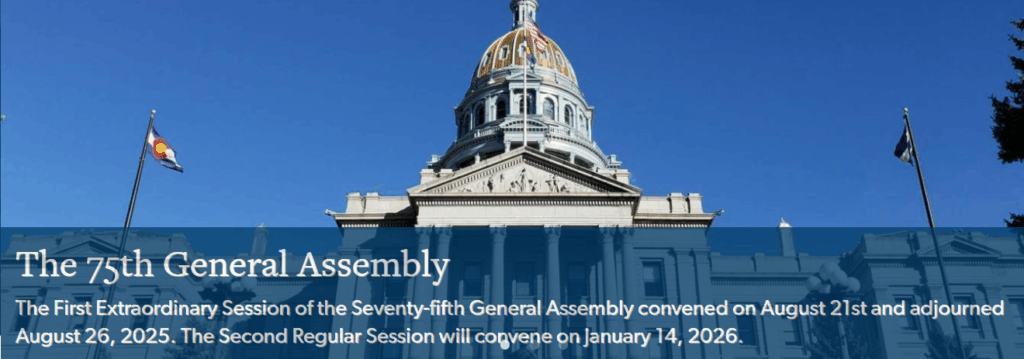Editor’s note: This article was originally written by Julie Pelegrin and posted on July 19, 2012. This version has been edited and updated for this week’s publication.
by Jery Payne
During the legislative session, legislators and legislative staff are so busy working with bills and amendments that we sometimes lack the time to step back and see the operations of the legislature in context with the other branches of state government. That is why it can be jarring when the drafter raises separation of power concerns. The specific constitutional authority given to and requirements imposed on each of the branches of state government can get confused and even overlooked in the rush of the legislative session.
The legislative interim affords us the luxury of time to review the state constitution and some of the court cases interpreting it and to remind ourselves of the roles of the executive, judicial, and, especially, legislative branches. This article looks at the constitutional authority of each branch of government, including the General Assembly, the constitutional limitations on that authority, and the constitutional requirements imposed on the General Assembly.
To understand the authority and role of the General Assembly in state government, we must first review how the state constitution generally distributes power in state government. Similar to the organization of powers at the federal level, Article III of the Colorado Constitution organizes power within the state government as follows:
The powers of the government of this state are divided into three distinct departments,—the legislative, executive and judicial; and no person or collection of persons charged with the exercise of powers properly belonging to one of these departments shall exercise any power properly belonging to either of the others, except as in this constitution expressly directed or permitted.
The state constitution then specifies the powers of the executive branch in Article IV, recognizing the governor as holding the “supreme executive power of the state” and charging the governor with faithfully executing the laws of the state. The governor has several specific constitutional powers, including acting as the commander in chief of the state’s military forces, granting reprieves and pardons, requesting information and reports from the executive branch agencies, annually reporting on the state of the state to the General Assembly, and annually accounting for the state’s expenditures and estimating the state’s anticipated revenues.
The state constitution gives the governor several powers that relate specifically to the General Assembly. The governor can convene the General Assembly in a special legislative session or adjourn the General Assembly if the House and Senate cannot agree on an adjournment date. The governor can veto entire substantive bills and veto specific line-items in appropriations bills. If the governor does not act to either sign or veto a bill within specified time periods, however, the bill becomes law without the signature.
The state constitution also lays out the powers of the judicial branch. Article VI specifically creates several courts, most notably a Supreme Court and district courts, to exercise the judicial power of the state. And Article VI authorizes the General Assembly to create additional courts. The General Assembly used this authority to create the Colorado Court of Appeals in statute.
Article VI goes on to describe the jurisdiction of the Supreme Court, the district courts, and the other courts listed in the constitution and the terms and qualifications of justices and judges. The state constitution also specifically authorizes the Supreme Court to adopt rules for the administration of the courts and for procedures in civil and criminal cases.
Article V of the state constitution establishes the legislative branch, giving it the “legislative power of the state,” but reserving to the people the powers of initiative and referendum. The other specific powers given to the General Assembly are the powers to adopt rules governing its proceedings and rules for enforcing its procedures, disciplining members, protecting members from violence and offers of bribes, and expelling members. The General Assembly’s list of specific powers is short because, unlike Congress and unlike the executive and judicial branches, the Colorado General Assembly’s power is plenary, rather than enumerated. This means that the General Assembly need not find a grant of power to legislate on a topic. So long as the legislation does not violate the state or federal constitutions, the General Assembly has the power to legislate on the subject.
The state constitution separates the powers of the executive, judicial, and legislative branches with the intent that each will exercise only those powers assigned to it and will not attempt to exercise powers assigned to one of the other branches; each will play in its own sandbox, so to speak. Not surprisingly, however, there is significant overlap among the separated powers.
For example, the General Assembly may adopt mandatory parole requirements, but these do not violate the court’s authority to sentence a defendant. (People v. Barth, 981 P.2d 1102 (Colo. App. 1999)). And although the state constitution gives the Supreme Court authority to set the procedural rules for criminal and civil trials, the General Assembly by statute may change those rules for substantive policy reasons, so long as the changes do not violate constitutional rights. (People v. Smith, 182 Colo. 228, 512 P.2d 269 (1973).)
Similarly, the state constitution gives the legislative power to the General Assembly, but the General Assembly can authorize an executive branch agency to adopt rules, so long as there are sufficient guidelines and safeguards. (Colo. Auto & Truck Wreckers Ass’n v. Dept. of Rev., 618 P.2d 646 (Colo. 1980)). And a court, in interpreting a statute, can require an executive branch agency to spend its appropriated funds for specific uses. (Goebel v. Colo. Dept. of Institutions, 764 P.2d 785 (Colo. 1988)).
The separation of powers among the three branches of government is real and enforceable, but these divisions are often neither as bright nor as distinct as some would like. When one of the branches does not exercise its authority, one of the other branches may attempt to use these ambiguities to usurp that authority. For example, if the General Assembly does not enact a policy through legislation, the executive branch may attempt to enact that policy either through an executive order or by rule-making. If this happens, the General Assembly may protect its constitutional authority either by enacting legislation to affirm or reverse the executive branch’s action or by bringing suit against the executive branch.








